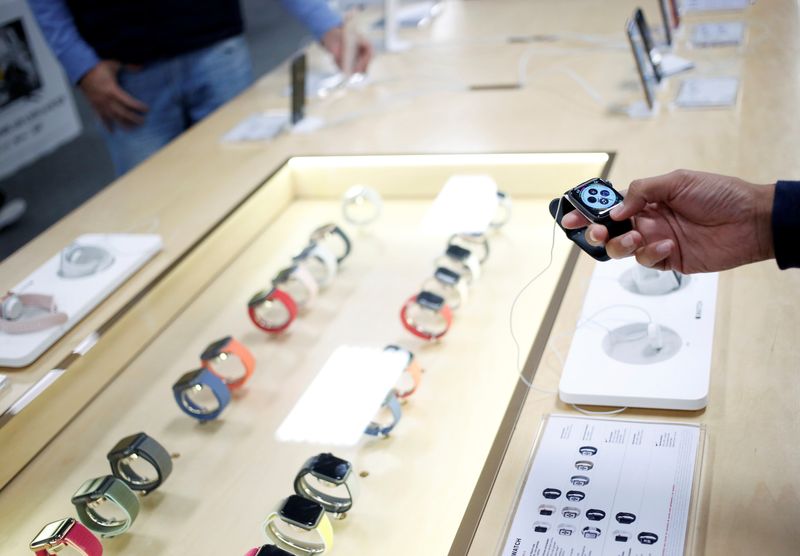Explainer-What’s next after pause of US Apple Watch import ban?
2023.12.27 17:34

© Reuters. FILE PHOTO: A shopper holds an Apple Watch during the shopping season, ‘El Buen Fin’ (The Good Weekend), at a store in Monterrey, Mexico November 15, 2019. REUTERS/Daniel Becerril/File Photo
By Blake Brittain
(Reuters) -A U.S. appeals court on Wednesday temporarily paused a ruling that had restricted imports of Apple (NASDAQ:)’s popular Apple Watches into the United States.
Here is a look at what the case means for consumers and what is next for Apple.
Why was the ban imposed?
The U.S. International Trade Commission in October ordered Apple to stop importing and selling some Apple Watches following a complaint from medical-monitoring technology company Masimo (NASDAQ:).
The ITC, a federal agency that handles international trade disputes, found that an Apple Watch feature for reading blood-oxygen levels infringed on Masimo’s pulse oximetry patents.
President Joe Biden’s administration had until Dec. 25 to veto the order based on public policy concerns but did not do so.
Cupertino, California-based Apple had preemptively paused U.S. sales of its latest high-end Series 9 and Ultra 2 models ahead of the Christmas Day deadline.
Apple appealed the ban to the U.S. Court of Appeals for the Federal Circuit in Washington. The court halted the ban on Wednesday while it considers the company’s request for a longer-term pause during the appeals process.
How are U.S. Apple Watch sales affected?
Wednesday’s decision allows Apple to continue importing and selling infringing Apple Watches while the court considers whether to put the ban on hold for the duration of the appeals process.
Apple Stores in New York and San Francisco told Reuters on Wednesday that they had yet to resume selling Series 9 and Ultra 2 Apple Watches and did not know when they would be available.
The ITC’s order does not affect the lower-priced Apple Watch SE, which does not have pulse-oximetry capabilities and remains on sale from Apple.
The ITC decision says it applies only to Apple Watches with the light-based pulse oximetry capability in question, but does not specify which models with that technology are affected. Apple first introduced pulse oximetry in its Series 6 watches, and Masimo has argued that all Apple Watches with the technology infringe its patents.
Apple said it would also stop replacing out-of-warranty watches going back to Series 6 based on the ban.
The ban specifically applies to Apple and its “affiliated companies, parents, subsidiaries, or other related business entities,” and may not affect other retailers.
Series 9 and Ultra 2 Apple Watches are still available from third-party sellers including Amazon (NASDAQ:), Best Buy (NYSE:) and Walmart (NYSE:).
What are the accusations against Apple?
Masimo, which released a watch last year that also reads blood-oxygen levels and tracks other health indicators, accused Apple of hiring away its employees and stealing its technology after discussing a potential collaboration. A jury trial on Masimo’s allegations in California federal court ended with a mistrial in May and has yet to be rescheduled.
Apple has called Irvine, California-based Masimo’s legal actions a scheme to clear a path for its competing smartwatch, and has countersued Masimo for patent infringement in Delaware federal court.
What are Apple’s other options?
In addition to its appeal, Apple is working on a redesign that would enable its watches to operate without infringing on Masimo’s patents. It could import and sell the redesigned watches regardless of the ITC’s ban if U.S. Customs and Border Protection approves the workaround.
Apple told the Federal Circuit on Tuesday that the customs agency is scheduled to make its decision on the workaround on Jan. 12.
Masimo has said that its patents cover hardware, and that a software fix would not work.
Masimo CEO Joe Kiani has also indicated that he is willing to settle the dispute.








